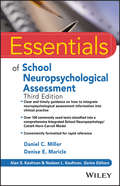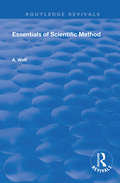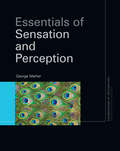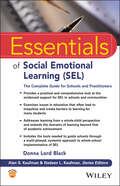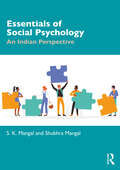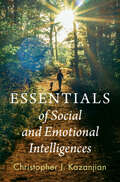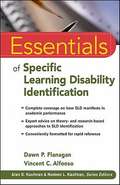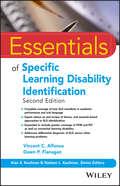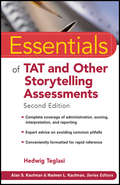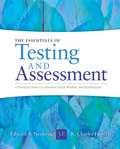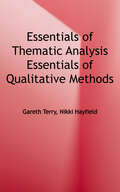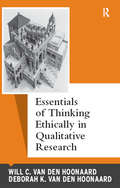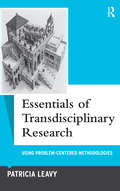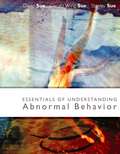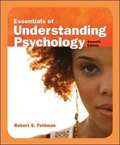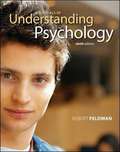- Table View
- List View
Essentials of School Neuropsychological Assessment (Essentials of Psychological Assessment #99)
by Daniel C. Miller Denise E. MaricleA concise, up-to-date review of school neuropsychological assessment that covers effective treatment planning The third edition of Essentials of School Neuropsychological Assessment offers a practical and concise overview of neuropsychological practice in schools and other pediatric clinical settings and clearly explains how to identify the need for testing. The book shows how to collect a neurodevelopmental history, choose appropriate assessment instruments, effectively evaluate students, and accurately interpret results. The third edition has been revised and updated to include the most recent advances in the field such as major neuropsychological test batteries for children, including NEPSY-II, Wechsler Intelligence Scale for Children, Fifth Edition integrated, and Delis-Kaplan Executive Function System. In addition, the new edition contains updated online tools, including sample case studies, searchable databases of neuropsychological tests classified by processing area and conceptual model, a neuropsychological processing concerns checklist in both English and Spanish, and sample report shells with tables. Like all the volumes in the Essentials of Psychological Assessment series, this book is designed to help busy practitioners and school psychologists quickly acquire the knowledge and skills they need to make optimal use of major psychological assessment instruments. Each concise chapter features numerous callout boxes highlighting key concepts, bulleted points, and extensive illustrative material, as well as test questions that help you gauge and reinforce your grasp of the information covered. Essentials of School Neuropsychological Assessment, Third Edition contains unmatched guidance and direction for school psychologists and other mental health professionals who serve educators, school children, and their families.
Essentials of Scientific Method (Routledge Revivals)
by A. WolfOriginally published in 1925, when it was published, this book was intended to give an up to date, concise account of the aim and methods of science with regards to Psychology. It contains chapters on various scientific methods such as the Evolutionary or Genetic Method, the Method of Difference and The Method of Residues, and chapters on probability and the laws of nature.
Essentials of Sensation and Perception (Foundations of Psychology)
by George MatherThe study of sensation and perception looks at how we acquire, process, and interpret information about the outside world. By describing key ideas from first principles, this straightforward introduction provides easy access to the basic concepts in the subject, and incorporates the most recent advances with useful historical background. The text takes a uniquely integrative approach, highlighting fundamental findings that apply across all the senses - including vision, hearing, touch, pain, balance, smell and taste - rather than considering each sense in isolation. Several pedagogical features help students to engage with the material. ‘Key Term’ and ‘Key Concept’ boxes describe technical terms and concepts whilst ‘Question’ boxes relate the material to everyday questions about perception. Each chapter ends with suggestions for further reading, and the final chapter draws together the material from the previous chapters, summarizing the broad principles described, and outlining some major unresolved issues. Assuming no prior knowledge, this book is an accessible and up-to-date overview of the processes of human sensation and perception. Presented in full color, it is an ideal introduction for pre-undergraduate and first year undergraduate students on courses in psychology, as well as neuroscience and biology.
Essentials of Social Emotional Learning: The Complete Guide for Schools and Practitioners (Essentials of Psychological Assessment)
by Donna Lord BlackA robust and comprehensive description and implementation roadmap of SEL across all levels of your school's curriculum In Essentials of Social Emotional Learning (SEL): The Complete Guide for Schools and Practitioners, learning expert and advocate Donna Black delivers a rigorous and compelling case for the adoption of crucial SEL components in your school, as well as a step-by-step guide to its implementation. The book walks readers through every step of understanding, designing, implementing, and measuring an SEL program designed to create lasting and powerful change for your students. The author describes strategies to engage students with relationships and instruct them in core skills. Essentials of Social Emotional Learning (SEL) also explores: The emergence of social emotional learning as a world phenomenon, including key definitions, critical areas of competence, historical influences, and the role of emotional intelligence in SEL. A rigorous review of current problems in education addressed by SEL, as well as the latest empirical support and validation for the model. A description of SEL as a sustainable framework for success, including a multi-phase guide to a whole-school implementation of SEL complete with tools, templates, and checklists. A start-to-finish roadmap on the implementation of social emotional learning in schools of all sizes, Essentials of Emotional Learning (SEL) is a must-read resource for school administrators, teachers, and parents of school age children with an interest in addressing the barriers often faced by students.
Essentials of Social Psychology: An Indian Perspective
by Shubhra Mangal Shashi Kumar MangalEssentials of Social Psychology: An Indian Perspective offers a comprehensive introduction to social psychology with a focus on the cultural and social fabric of Indian society. Split into five sections, the book covers the nature, scope, history and methods of social psychology; individual level processes; interpersonal level processes; social processes; group processes; and social issues. The authors, S.K. Mangal and Shubhra Mangal, address the latest research trends, and offer a varied insight into a range of topics including social influence, social exchange processes, group dynamics, aggression, prejudice and attitudes. The book also examines topical themes and includes two chapters on social issues facing contemporary Indian society. While highlighting significant Indian research contributions and including examples and case studies from an Indian context, this book goes on to examine the discipline in the context of the socio-psychological background of this subcontinent. Complex concepts are clearly explained and the book aids student learning through useful pedagogical features such as assessment questions, case studies, chapter summaries and boxed key points. Covering all the core topics within social psychology, this is an essential textbook for graduate or undergraduate courses in social psychology, social work, social neuroscience, community medicine or public health. In addition, it’s also a useful introduction for those taking the Psychology option for the Indian and Provincial Civil Services and other competitive examinations.
Essentials of Social and Emotional Intelligences
by Christopher J. KazanjianEssentials of the Social and Emotional Intelligences explores the foundations of social and emotional intelligences from a multicultural humanistic psychology perspective. Delving into the spectrum of abilities associated with holistic emotional processes, this book unravels the intricacies of developing self-awareness, regulating emotional states, fostering social awareness and empathy, exercising freedom of choice, and building diverse relationships. Offering a unique theoretical synthesis of humanistic psychology and multicultural education, the text provides diverse perspectives on complex phenomena within social and emotional intelligences, including empathy, spirituality, loneliness, self-awareness, and cultural humility. Through a fusion of empirical research studies and multicultural insights, this book equips readers with the knowledge to cultivate these essential skills within themselves and foster meaningful connections with others. This concise guide is ideal for students, professionals, educators and laypersons hoping to build their fundamental knowledge in utilizing social and emotional intelligences.
Essentials of Specific Learning Disability Identification
by Dawn P. Flanagan Vincent C. AlfonsoComplete coverage on how SLD manifests in academic performanceExpert advice on theory- and research-based approaches to SLD identificationConveniently formatted for rapid referenceQuickly acquire the knowledge and skills you need to accurately identify specific learning disabilitiesEssentials of Specific Learning Disability Identification provides a brief overview examining the definitions and classification systems of--and methods for--identification of specific learning disabilities (SLDs). Focusing on descriptive efforts of the manifestations of SLDs in the academically critical areas of reading, writing, math, oral expression, and listening comprehension, this book features contributions by leading experts in the field, including Virginia Berninger, Steven Feifer, Jack Fletcher, Nancy Mather, Jack Naglieri, and more.Like all the volumes in the Essentials of Psychological Assessment series, each concise chapter features numerous callout boxes highlighting key concepts, bulleted points, and extensive illustrative material, as well as test questions that help you gauge and reinforce your grasp of the information covered.With multiple perspectives spanning several different theoretical orientations and offering various approaches to SLD identification that can be put into practice right away--from RTI methods to cognitive strengths and weaknesses approaches--this book offers important content for professionals who work with children and youth at risk for learning disabilities. With a Foreword by Cecil Reynolds, Essentials of Specific Learning Disability Identification presents rich and up-to-date information on models and methods of SLD identification.
Essentials of Specific Learning Disability Identification (Essentials of Psychological Assessment #82)
by Dawn P. Flanagan Vincent C. AlfonsoPractical, up-to-date guidance on identifying Specific Learning Disability Essentials of Specific Learning Disability Identification provides accessible, authoritative guidance on specific learning disability (SLD), with the most up-to-date information on assessment, identification, interventions, and more. Contributions by leading experts examine multiple theoretical orientations and various identification approaches for dyslexia, dyscalculia, dysgraphia, and other common SLDs. Emphasizing real-world utility, this book provides important information for professionals who work with children and youth at risk; many of the SLD identification practices can be put to work immediately, and the expert coverage offers many strategies and interventions for student support in the classroom. This new second edition has been updated to align with the most current understanding of SLD manifestations, diagnostic assessment, and evidence-based interventions, and includes new material covering nonverbal learning disability, speech-language impairment, general learning difficulties, and differentially diagnosing SLD from other conditions. Early SLD identification and the right kind of help can raise the trajectory of a child's life. This book provides in-depth information to facilitate accurate identification and appropriate intervention to help you help the children in your care. Understand how SLD manifests in academic performance Learn theory- and research-based approaches to SLD identification Examine the latest information about new aspects of SLD determination Utilize appropriate and effective intervention strategies for student support If a child's learning disability is caught early, and the correct type of support is provided, that child gets the chance to develop the skills that lead to achievement in school and beyond. As a high-incidence disorder, SLD affects 10-15 percent of the general population, making successful identification an essential skill for those who work with children. Essentials of Specific Learning Disability Identification provides authoritative guidance and practical methods that can help you start changing children's lives today.
Essentials of TAT and Other Storytelling Assessments
by Hedwig TeglasiQuickly acquire the knowledge and skills you need to confidently administer, score, and interpret a variety of storytelling techniques Storytelling techniques are a popular projective approach for assessing many aspects of a person's personality, such as cognitive processes, emotional functioning, and self-regulation. The broad spectrum of techniques includes the Thematic Apperception Test (TAT-the most widely embraced), Roberts-2, and TEMAS (Tell-Me-A-Story). To use these tests properly, professionals need an authoritative source of advice and guidance on how to administer, score, and interpret them. Written by Hedwig Teglasi, a leading researcher of the TAT and other storytelling techniques, Essentials of TAT and Other Storytelling Assessments, Second Edition is that source. Like all the volumes in the Essentials of Psychological Assessment series, this book is designed to help busy mental health professionals, and those in training, quickly acquire the knowledge and skills they need to make optimal use of major psychological assessment instruments. Each concise chapter features numerous callout boxes highlighting key concepts, bulleted points, and extensive illustrative material, as well as test questions that help you gauge and reinforce your grasp of the information covered. Fully revised and updated to reflect the current research supporting storytelling techniques, Essentials of TAT and Other Storytelling Assessments, Second Edition reflects the latest data and theory on scoring stories and includes new material on interpreting stories in reference to a person's abilities in cognition, emotion, relationships, motivation, and self-regulation. As well, the author provides expert assessment of the methods' relative strengths and weaknesses, valuable advice on their clinical applications, and several case studies to illustrate best practices for implementing the storytelling approach to personality assessment. Other titles in the Essentials of Psychological Assessment series: Essentials of Assessment Report Writing Essentials of PAI Assessment Essentials of 16PF Assessment Essentials of Neuropsychological Assessment, Second Edition Essentials of MillonTM Inventories Assessment, Third Edition Essentials of Rorschach Assessment Essentials of MMPI-2 Assessment Essentials of MMPI-A Assessment
Essentials of Telebehavioral Health: A Practical Guide
by Hossam Mahmoud Hady Naal Emile WhaibehTelebehavioral Health (TBH), defined as the use of information and telecommunication technologies for remote behavioral health service delivery, has witnessed exponential growth in recent years. The increase in TBH adoption can be attributed to several factors such as: increasing demand for behavioral health services, increasing availability of high-speed internet, decreasing cost of technology, expansion of reimbursement, and growing scientific evidence demonstrating its effectiveness across various patient populations, psychiatric conditions, and clinical settings. The COVID-19 pandemic further catapulted TBH expansion and scaling, as social distancing and lockdown measures left both clinicians and patients with limited alternatives. Essentials of Telebehavioral Health: A Practical Guide comes at a time when TBH’s effectiveness is well-established, its position in healthcare systems secure and uncontested, and the conversation around it shifting from “if” to “how” it could be implemented. The success of TBH programs is contingent on the careful planning, meticulous implementation, and continuous monitoring and evaluation of its essential components, with special emphasis on clinical, technical, legal and ethical considerations. While there are existing resources that offer road maps for TBH program implementation, what this book provides is hands-on support and guidance to set up and maintain a TBH practice, focusing on both its programmatic and clinical aspects. Its simple structure, succinctness, and scientific rigor make it suitable for both professional and educational settings. In addition to contributing to the writeup, the editors enlisted several authors with a wealth of practical knowledge and firsthand clinical experience on TBH implementation and delivery. The user experience is enhanced through explanatory figures, synthesis tables, visual aids, end-of-section checklists, and summaries in bullet-point format. Essentials of Telebehavioral Health: A Practical Guide is a concise and evidence-based guide that synthesizes decades’ worth of knowledge and experience into key pointers for clinicians, professionals, and interested learners on how to plan, implement, deliver, evaluate, and ensure the sustainability of TBH programs. As the most up-to-date text on TBH, this book serves as a go-to resource for healthcare professionals, clinicians, students and trainees with minimal to no formal education on TBH, to work towards adopting this modality in a synthesised and easy to read format.
Essentials of Temperament Assessment
by Diana JoyceQuickly acquire the knowledge and skills you need to effectively conduct a comprehensive temperament assessmentUnderstanding temperament has the potential to better inform treatment and intervention choices as well as promote awareness for qualities that are somewhat malleable. Essentials of Temperament Assessment presents balanced coverage of those instruments that directly measure temperament qualities in adults and children. This guide enables mental health professionals to select the method that best fits the situations, groups of people, and programs that are involved.With an overview of clinical applications of temperament assessments, Essentials of Temperament Assessment gathers as many resources as possible to enable professionals to make their own judgment about the most appropriate temperament assessments, including: New York Longitudinal Scales Adult Temperament Questionnaire (ATQ) Carey Temperament Scales (CTS) Myers-Briggs Type Indicator? (MBTI?) Student Styles Questionnaire (SSQ)Like all the volumes in the Essentials of Psychological Assessment series, this book is designed to help busy mental health professionals, and those in training, quickly acquire the knowledge and skills they need to make optimal use of major psychological assessment instruments. Each concise chapter features numerous callout boxes highlighting key concepts, bulleted points, and extensive illustrative material, as well as test questions that help you gauge and reinforce your grasp of the information covered.Offering a myriad of ways to assess temperament, Essentials of Temperament Assessment arms professionals with the most appropriate technique or combination of techniques for their particular temperament assessment purposes.
Essentials of Testing and Assessment: A Practical Guide to Counselors, Social Workers, and Psychologists (Third Edition)
by Edward S. Neukrug R. Charles FawcettThis book introduces learners to the concepts and applications of assessment and testing. Case vignettes, samples of real tests, and additional activities and exercises increase understanding.
Essentials of Thematic Analysis (Essentials of Qualitative Methods)
by Nikki Hayfield Gareth TerryThe brief, practical texts in the Essentials of Qualitative Methods series introduce social science and psychology researchers to key approaches to qualitative methods, offering exciting opportunities to gather in-depth qualitative data and to develop rich and useful findings. In this book, Gareth Terry and Nikki Hayfield introduce readers to reflexive thematic analysis, a method of analyzing interview and focus group transcripts, qualitative survey responses, and other qualitative data. <p><p>Central to this method is the recognition that we are all situated in a particular context, and that we see and speak from that position. This leads researchers to produce knowledge that represents situated truths, providing insights into people's perspectives on a given topic. <p><P>About the Essentials of Qualitative Methods book series: <p>Even for experienced researchers, selecting and correctly applying the right method can be challenging. In this groundbreaking series, leading experts in qualitative methods provide clear, crisp, and comprehensive descriptions of their approach, including its methodological integrity, and its benefits and limitations. Each book includes numerous examples to enable readers to quickly and thoroughly grasp how to leverage these valuable methods.
Essentials of Thinking Ethically in Qualitative Research (Qualitative Essentials #10)
by Will C van den Hoonaard Deborah K van den HoonaardEthical dimensions of qualitative research are constantly emerging and shifting. This volume identifies relevant ethical principles that can guide novice researchers through the research process with the necessary wisdom and insight to shape a project in sound, meaningful, and thoughtful ways. Well known for their work in this area, the van den Hoonaards outline the domains on which ethics most often impinge. They address key ethical issues arising in different qualitative traditions and contexts. The volume concludes with guidance on how to navigate formal ethics reviews. Many key examples and other resources help the student engage the complicated literature on this topic.
Essentials of Transdisciplinary Research: Using Problem-Centered Methodologies (Qualitative Essentials #6)
by Patricia LeavyTransdisciplinary research is issue-driven, addressing contemporary social questions from a range of critical theoretical perspectives unhampered by the theoretical and methodological restrictions of traditional disciplinary boundaries. In this brief, informative guide, Patricia Leavy shows how a transdisciplinary approach can produce more effective results for researchers hoping to ameliorate social problems and foster social justice. Leavy demonstrates the value of transdisciplinary approaches in mixed methods design, and how trans approaches actually help fulfill the promises and goals of mixed methods research. She explains its relationship to multi-disciplinary and interdisciplinary research and its value in community-based and arts-based research projects. Providing the key principles and methods needed to conduct a transdisciplinary study, Leavy also offers numerous examples from multiple research sectors to show its effectiveness. Ideal as a brief introductory text for students engaged in this style of research.
Essentials of Trauma-Informed Assessment and Intervention in School and Community Settings (Essentials of Psychological Assessment)
by Kirby L. Wycoff Bettina FranzeseUnderstanding how chronic stress affects child development with step-by-step guidelines for conducting trauma-informed assessments and interventions Children exposed to early negative and adverse experiences may not think, feel, process emotions, behave, respond to, or relate to others the same way that typically developing children do. If psychologists do not appreciate and understand the effects of trauma in the lives of children, they may be working in ways that are not efficient or effective and may actually be providing a disservice to the children and families they serve. This volume provides an overview of the deleterious effects of adverse childhood experiences (also referred to as complex trauma, toxic stress or developmental trauma) on children's functioning, adjustment, cognitive, social-emotional, behavioral, academic, and neuropsychological outcomes. Complex trauma can alter brain structure and function and throw children off a normal developmental trajectory resulting in a myriad of negative outcomes. In addition, step-by-step guidelines are provided for conducting trauma-informed assessments, treatments, and interventions. Understand how early stressors can affect influence normal development and influence child psychopathology Learn how exposure to early life adversity affects the biological stress systems which can compromise normal brain development Become familiar with the functions and neuropsychological constructs associated with brain regions affected by chronic stress. Identify risk factors that can negatively influence children’s behavioral, social, emotional, cognitive, and academic functioning Identify and use trauma-sensitive assessment instruments and protocols Gather background and family history from a trauma perspective Use evidence-based interventions to best meet each child's unique needs Essentials of Trauma-Informed Assessment and Interventions in the Schools is essential reading for school, clinical, and related psychologists and their trainers.
Essentials of Treatment Planning
by Mark E. MaruishPsychologists, psychiatrists, clinical social workers, and other behavioral health care professionals practicing in this new millennium are all aware of the importance of having a specific, individualized plan to guide the treatment of their patients. Many of these same people might be surprised to know that formalized treatment planning is a relatively new component of mental health and substance abuse treatment.
Essentials of Treatment Planning (Essentials of Psychological Assessment #32)
by Mark E. MaruishEssentials of Treatment Planning, Second Edition is an updated and easy-to-use guide to the development and use of treatment plans for behavioral health care patients. The book incorporates current research and developments in treatment planning that have occurred since the publication of the first edition. Designed as a nuts-and-bolts guide, the book covers essential material such as the role and benefits of treatment planning in a clinical setting, approaches for conducting comprehensive patient assessments, the use of assessment information to develop individual treatment plans, and strategies for ongoing evaluations and revisions of treatment plans. Essentials of Treatment Planning, Second Edition explores how to develop and use treatment plans to strengthen the entire treatment process. An important component in documentation, accurate treatment plans provide myriad benefits, including: meeting the accountability criteria of insurers and behavioral health care organizations, enhancing efficient coordination of care with other health care professionals, and facilitating better communication with outside reviewers. In addition, behavioral health professionals—psychologists, psychiatrists, clinical social workers, mental health and substance use counselors, and others—may gain the added security of protection from certain types of litigation. As part of the Essentials of Mental Health Practice series, the second edition of Essentials of Treatment Planning contains the information busy behavioral health professionals need to practice knowledgeably, efficiently, and ethically in today's behavioral health care environment. Each chapter features numerous callout boxes highlighting key concepts, bulleted points, and extensive illustrative material, as well as "Test Yourself" questions that help gauge and reinforce your grasp of the information covered.
Essentials of Understanding Abnormal Behavior
by David Sue Herald Wing Sue Stanley SueAn elaborate text on why people exhibit abnormal behaviours, how they express their disturbances, and how such behaviours can be prevented, diagnosed and treated.
Essentials of Understanding Psychology
by Robert S. FeldmanStudents First. Designed for student success, Essentials of Understanding Psychology provides students with a brief and powerful learning framework to help them connect, engage, and feel excited about psychology.
Essentials of Understanding Psychology (7th Edition)
by Robert S. FeldmanEssentials of Understanding Psychology, Seventh Edition, is the core of a learning-centered multimedia package that comprises a complete framework for learning and assessment. Conforming to recommendations of a 2002 APA task force report on undergraduate student competencies (Board of Educational Affairs, 2002), every component of the package is tied to specific psychological concepts and their application in everyday life. Though the book forms the core of this framework, its power to enrich and empirically demonstrate learning is expanded through a unique library of electronic activities with concept-based quizzes, all developed to accompany this text.
Essentials of Understanding Psychology (9th Edition)
by Robert S. FeldmanThe ninth edition contains a significant number of new and updated features and content, reflecting advances in the field. In particular, chapters on sensation and perception, states of consciousness, and thinking, language, and intelligence have been heavily revised. Some 1,000 new citations have been added to the text, most referring to articles and books published since 2008.
Essentials of Understanding Psychology (Twelfth Edition)
by Robert FeldmanYour students are individuals. Do your teaching materials treat them that way? Feldman's Essentials of Understanding Psychology does. Using a revolutionary revision process, Bob Feldman's Essentials of Understanding Psychology is a fully integrated learning system that gives students an even greater opportunity to achieve success, and brings the Students First goal to a new level. With an adaptive learning system that provides an individualized learning environment and helps students identify what they know, and more importantly, what they don't, every student has a unique experience refined to their needs.
Essentials of WAIS-IV Assessment
by Alan S. Kaufman Elizabeth O. LichtenbergerQuickly acquire the knowledge and skills you need to confidently administer, score, and interpret the WAIS®-IVCoauthored by Alan S. Kaufman, who was mentored by David Wechsler-the creator of the Wechsler scales-Essentials of WAIS®-IV Assessment, Second Edition is thoroughly revised and updated to provide beginning and seasoned clinicians with comprehensive step-by-step guidelines for effective use of the WAIS®-IV. This invaluable guide provides clinicians with a brand new interpretive process, overhauling its system of profile interpretation to be equally powerful across the entire WAIS®-IV age range.Like all the volumes in the Essentials of Psychological Assessment series, this book is designed to help busy mental health professionals quickly acquire the basic knowledge and skills they need to make optimal use of a major psychological assessment instrument. Each concise chapter features numerous callout boxes highlighting key concepts, bulleted points, and extensive illustrative material, as well as test questions that help you gauge and reinforce your grasp of the information covered.The new edition explores timely topics including gender and ethnic differences, as well as the role of the Flynn Effect in capital punishment court cases. Along with an accompanying CD-ROM containing scoring tables and case report material, the Second Edition includes information and advice on how to administer Q-interactive -the new digital version of the test-for administration of the WAIS®-IV via iPad®.Other titles in the Essentials of Psychological Assessment series:Essentials of Assessment Report WritingEssentials of WISC®-IV Assessment, Second EditionEssentials of WMS®-IV AssessmentEssentials of Cross-Battery Assessment, Third EditionEssentials of WJ III Tests of Achievement AssessmentEssentials of WJ III Cognitive Abilities Assessment, Second EditionEssentials of Neuropsychological Assessment, Second Edition
Essentials of WIAT-III and KTEA-II Assessment
by Lichtenberger Elizabeth O. Breaux Kristina C.Quickly acquire the knowledge and skills you need to confidently administer, score, and interpret the WIAT-III and KTEA-II Essentials of WIAT-III and KTEA-II Assessment is the only resource providing practical, step-by-step instruction in the accurate and effective use of the Wechsler Individual Achievement Test, Third Edition (WIAT-III) and the Kaufman Test of Educational Achievement, Second Edition (KTEA-II), two popular measures of individual achievement frequently administered for educational planning, transitional programming for students with disabilities, and vocational guidance. Like all the volumes in the Essentials of Psychological Assessment series, this book is designed to help busy mental health practitioners, and those in training, quickly acquire the basic knowledge and skills they need to make optimal use of a major psychological assessment instrument. Each concise chapter features numerous callout boxes highlighting key concepts, bulleted points, and extensive illustrative material, as well as test questions that help you gauge and reinforce your grasp of the information covered. Offering up-to-date and rich information beyond what is available in the tests' manuals, Essentials of WIAT-III and KTEA-II Assessment includes case studies illustrating how to make optimal use of the tests. In addition, the book is packaged with an accompanying CD-ROM containing a program allowing users to enter KTEA-II data to obtain growth scores; useful files to assist users in the proper administration and scoring of the WIAT-III Written Expression subtests; and a cross-battery approach for both tests. Note: CD-ROM/DVD and other supplementary materials are not included as part of eBook file.
